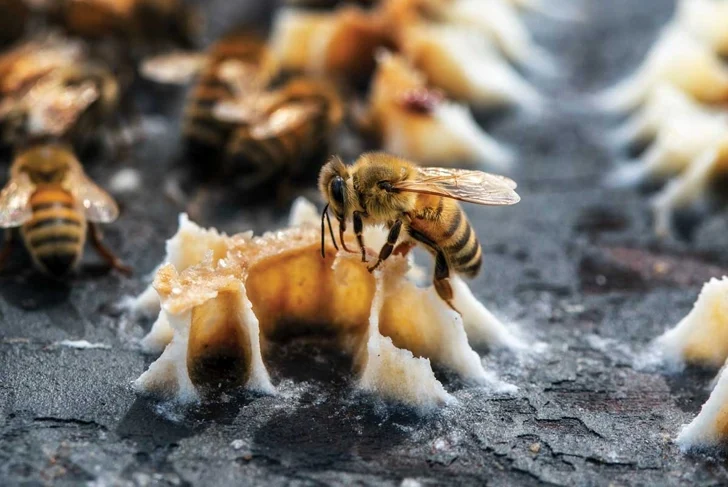The Healing Power of the Hive: How Bees Support Human Health
Long before modern medicine, humans turned to the natural world for remedies—and bees have long been among our most powerful allies. Their hive is more than a place of buzzing activity; it’s a pharmacy of healing potential. Two of the most valuable gifts from bees, propolis and bee pollen, have been used for centuries to support immunity, treat infections, and enhance overall wellness. Today, both are making a comeback as science uncovers the full scope of their benefits.
Propolis: The Bee’s Secret to a Clean Hive—and a Healthy Body
Derived from the Greek word propolis, meaning “to defend the city,” this sticky, resin-like substance is affectionately known as “bee glue.” Bees collect it from plant resins and use it to patch up cracks in the hive, smooth out surfaces, and maintain an infection-resistant, temperature-stable environment.
But propolis doesn’t just benefit the hive—it has impressive benefits for human health too.
A Natural Powerhouse
Propolis is rich in over 500 compounds, including flavonoids, polyphenols, vitamins, minerals, and amino acids. These components give it wide-ranging properties: it’s known to be antiseptic, anti-inflammatory, antimicrobial, antifungal, antioxidant, and even anticancer in certain contexts.
“Propolis is incredibly versatile,” says Dr. Karen Wright, a naturopathic doctor in Vancouver. “It’s particularly effective for mouth and skin conditions and has been shown to fight off bacteria, viruses, fungi, and yeast. Its anti-inflammatory and antioxidant actions make it a valuable support for healing.”
Traditionally, it’s been used to support recovery from wounds, burns, digestive issues, respiratory ailments, and even neurodegenerative and cardiovascular conditions. Though larger-scale human studies are still in progress, smaller clinical trials and animal studies offer promising evidence.
Gut Health and Candida Support
Propolis may also support those battling digestive issues caused by Candida overgrowth—a common concern that can be difficult to treat with conventional antifungals alone.
“In cases where fungal infections don’t respond to prescriptions, propolis may be a good complementary therapy,” says Dr. Tasreen Alibhai of Vitalia Health Care. “It shows antibacterial and antifungal potential, especially for resistant strains.”
Bee Pollen: Nutrition in a Tiny Package
Bee pollen is another treasure from the hive. As bees collect pollen from flowers, they mix it with nectar or honey and saliva, forming tiny granules that they transport back to the hive in sacs on their legs. There, it ferments into “bee bread,” the primary protein source for the colony.
Tiny Granules, Big Benefits
Bee pollen is rich in nutrients—vitamins, minerals, carbohydrates, lipids, and protein. Its anti-inflammatory and antioxidant properties make it a favorite among natural health advocates.
Not only can bee pollen support immune health, but it may also help accelerate wound healing and protect the body from harmful microorganisms. Studies have shown that it can reduce the presence of harmful bacteria like E. coli, Salmonella, and Staphylococcus aureus.
Boosting Immunity and Beyond
Both bee pollen and propolis are considered immunomodulators—meaning they help regulate and enhance the immune system’s response. Research indicates propolis may stimulate the production of antibodies and promote immune activity when the body is under attack from infection.
Bee pollen also strengthens immune responses and may improve the body’s resistance to illness, making it a helpful tool during cold and flu season.
Natural Allergy Relief?
Interestingly, both substances may help reduce allergy symptoms. Propolis and bee pollen have been shown to inhibit histamine release—the chemical responsible for sneezing, itching, and other allergic responses. They also seem to reduce mast cell activation, which plays a central role in allergic reactions.
However, this benefit comes with a major caveat: these products can themselves cause allergic reactions, especially in people who are allergic to bees, pollen, or tree resin. Experts caution against their use in children, pregnant women, or anyone with known allergies to bee products.
In addition, bee pollen may interfere with blood-thinning medications like warfarin, and propolis can interact with prescription drugs processed by the liver. If you’re taking any medication or have health concerns, always consult a healthcare provider before introducing bee products.
Propolis and Viral Protection
With its antiviral qualities, propolis may offer additional protection during viral outbreaks. Preliminary studies suggest it could help reduce the severity of viral infections by blocking certain enzymes and inflammatory pathways, including those related to the SARS-CoV-2 virus responsible for COVID-19.
While not a cure or replacement for medical treatment, propolis could serve as a supportive element in immune-boosting protocols.
How to Use Bee Products in Daily Life
Bee Pollen:
Bee pollen is available in its raw form—small, colorful granules with a slightly sweet, floral taste. Just one tablespoon contains a modest 16 calories but delivers a nutrient-dense punch. It can be sprinkled into:
- Yogurt or oatmeal
- Smoothies or protein shakes
- Salads or grain bowls
- Homemade granola or snack bars
Start with a small amount to ensure no allergic reaction and gradually increase if well tolerated.
Propolis:
Propolis comes in various formats, including chewable tablets, capsules, tinctures, sprays, creams, and lozenges. Thanks to its antibacterial and anti-inflammatory effects, it’s commonly used in:
- Mouthwash and throat sprays
- Healing creams and ointments
- Cough lozenges
- Skincare and cosmetic products
Always choose high-quality, reputable sources for both propolis and bee pollen, as purity and potency can vary.
The Buzz on Bee-Based Wellness
Bees may be small, but their contribution to our health is anything but. Propolis and bee pollen offer a wide range of benefits—from immune support to wound healing and possibly even allergy relief. While more research is needed to fully understand their potential, centuries of traditional use and growing scientific evidence suggest that the buzz around bee-based wellness is well-deserved.
Still, as with all natural remedies, it’s essential to use them wisely and consult a healthcare professional—especially if you have allergies or medical conditions. With care and awareness, the healing power of the hive might just be one of nature’s sweetest gifts.

